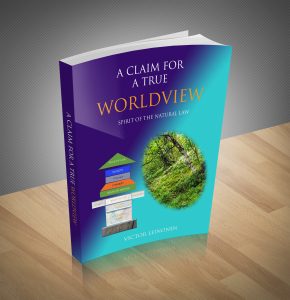NATURAL LAW THEORY , CAN BE DISCOVERED THROUGH DEDUCTIVE REASONING.
“Deductive reasoning, also deductive logic, logical deduction is the process of reasoning from one or more statements (premises) to reach a logically certain conclusion.”
“If we have no confidence in deductive logical reasoning, then we have no confidence in the ability to think about knowledge. If we have no confidence in thinking knowledge, then we are in the state of ignorance.”
WHAT IS A WORLD VIEW?
To explain the use of a word, it may well be that the use of the word worldview is merely a shortcut to a concept that contains many elements. Similarly, someone may ask a person whether he or she has any wheels? What kind of a question is that?
They could ask the question in another way, e.g., does one have a drive train, a differential, axle, bearings, hub, rim, inner tube and a tire? That would be the extended version of the question, “do you have any wheels”?
It cuts to the chase. The meaning of the question is, does one have a car? A bike or a skateboard to travel with?
Similarly, to ask a person what their worldview is? Is a simple question, of a concept? For the argument made here, referring to a reality-based Biblical worldview.
A reality-based worldview defended here is logical and rational:
- Reality. Truth based, factual knowledge about human nature and life on earth.
- Beliefs. What is True?
- Values. What is Right?
- Behavior and habits. What is the right behavior?
Why is the right choice an intelligent choice? Because, it is giving space to the priori wisdom of the Creator of life, and it is giving priority to the right outcome. The right outcome is objectively verifiable. The right outcome is always competed for by many distractions, temptations, and compromise. The need to have absolutes for intelligent decision outcomes, for problem-solving. Artificial intelligence also requires absolute values and absolute definitions. Also, for mathematics and geometry. 2+2 = 4. A square is a square and circle is a circle, they are not equal in shape.
Nobody complains that there are absolutes in mathematics, or absolutes in scientific engineering, it makes a whole lot of sense. Absolute values are also rewarding when purchasing a thing or a machine or flying overseas at 10,000 meters altitude in a crowded passenger jet. Who cares about the absolutes of engineering? The controlled flight maintained by the precision engineering of aviation technology and human knowledge.
The most common controversial area where people complain about absolutes are the moral ones. They protest the idea that there are absolute values in human conduct and morality. Could it be that their self-determination is heading south? Moreover, the God-given moral law, in the situation, is pointing north? That creates a conflict of interest, a dilemma.
“For where your treasure is, there your heart will be also.”
Matthew 6:21. (NIV)
That challenges the individuals living soul core, the intellect, the will, and the heart. Are there such absolutes? Yes, there are.
Where do they come from? It comes from the Intelligent mind of the Creator God. Also from human beings made in the image of God. With an Intellect, consciousness, imagination, will, memory and emotions. This is how John Locke describes them.
“The law of nature constrains what we can do, even when we are free in the state of nature.”
We are not free to do whatever we feel or desire to do. There have to be constraints in a multi-people society.
What are the constraints?
”The only constraint in the state of nature is, that the rights that we have, we cannot give them up, nor can we take them from someone body else. Under the law of nature, I am not free to take them from someone else”.
(Locke, THIS LAND IS MY LAND, 2009)
Life, liberty or property. Nor am I free to take my own life, liberty or property. Where does the law of nature constraints come from? John Locke gives two answers.
“For we, being all the workmanship of one omnipotent, and infinitely wise maker, they are his property, whose workmanship they are, made to last during his, not one another’s pleasure.”
(John Locke)
This article was from The Nemesis Book 2018. Click The Nemesis book Link to read more.

 Bloggers Guide To Arctic Finland 2020
Bloggers Guide To Arctic Finland 2020 New Book Out!
New Book Out! Travel Guide To Arctic Finland
Travel Guide To Arctic Finland Recent Posts
Recent Posts


Leave a Reply